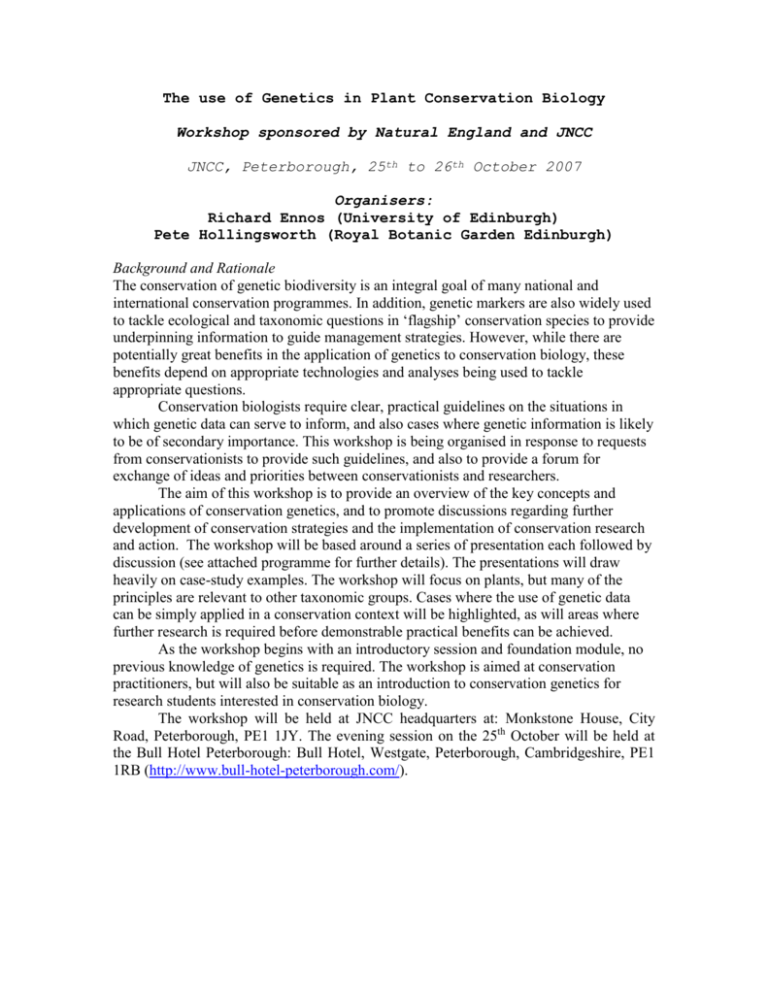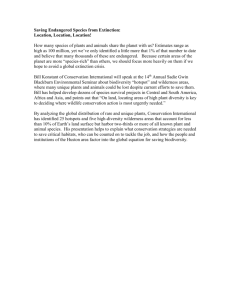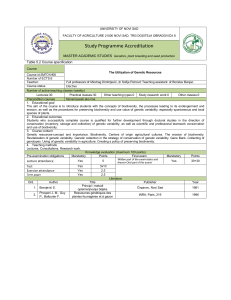Topics - Royal Botanic Garden Edinburgh
advertisement

The use of Genetics in Plant Conservation Biology Workshop sponsored by Natural England and JNCC JNCC, Peterborough, 25th to 26th October 2007 Organisers: Richard Ennos (University of Edinburgh) Pete Hollingsworth (Royal Botanic Garden Edinburgh) Background and Rationale The conservation of genetic biodiversity is an integral goal of many national and international conservation programmes. In addition, genetic markers are also widely used to tackle ecological and taxonomic questions in ‘flagship’ conservation species to provide underpinning information to guide management strategies. However, while there are potentially great benefits in the application of genetics to conservation biology, these benefits depend on appropriate technologies and analyses being used to tackle appropriate questions. Conservation biologists require clear, practical guidelines on the situations in which genetic data can serve to inform, and also cases where genetic information is likely to be of secondary importance. This workshop is being organised in response to requests from conservationists to provide such guidelines, and also to provide a forum for exchange of ideas and priorities between conservationists and researchers. The aim of this workshop is to provide an overview of the key concepts and applications of conservation genetics, and to promote discussions regarding further development of conservation strategies and the implementation of conservation research and action. The workshop will be based around a series of presentation each followed by discussion (see attached programme for further details). The presentations will draw heavily on case-study examples. The workshop will focus on plants, but many of the principles are relevant to other taxonomic groups. Cases where the use of genetic data can be simply applied in a conservation context will be highlighted, as will areas where further research is required before demonstrable practical benefits can be achieved. As the workshop begins with an introductory session and foundation module, no previous knowledge of genetics is required. The workshop is aimed at conservation practitioners, but will also be suitable as an introduction to conservation genetics for research students interested in conservation biology. The workshop will be held at JNCC headquarters at: Monkstone House, City Road, Peterborough, PE1 1JY. The evening session on the 25th October will be held at the Bull Hotel Peterborough: Bull Hotel, Westgate, Peterborough, Cambridgeshire, PE1 1RB (http://www.bull-hotel-peterborough.com/). The use of Genetics in Plant Conservation Biology PROGRAMME DETAILS Venue Monkstone House: 25th October (10.45 – 12.30) 1) Introductory session and foundation module Definitions of conservation genetics and introduction of major workshop themes Background to terminology/concepts/approaches Major determinants of the amounts and partitioning of genetic diversity Types of genetic information (molecular approaches, non-molecular approaches) How genetic diversity is quantified 25th October (1.30 – 5.30) 2) The management of genetic biodiversity Modern conservation programmes typically recognise biodiversity at three levels: habitat diversity, species diversity and genetic diversity. Whilst action plans for species and habitat diversity are usually clearly expressed, clear targeted strategies for the conservation of genetic biodiversity are rarely presented. This session will cover: types of genetic diversity, how it is distributed, how it is lost, what the problems associated with loss are, and some thoughts on its management. A particular focus of this section will be on the genetic issues associated with small population sizes. Topics: Value of genetic diversity Organisation of genetic biodiversity over different spatial/temporal scales Factors that may lead to the erosion of genetic biodiversity Genetic resource management and conservation strategies both in situ and ex situ Evening session (venue Bull Hotel): discussion on topics raised during the day, and opportunity for workshop delegates to raise practical examples of where genetic issues are a potential concern in their work. Venue Monkstone House: 26th October (9.15 – 10.30) 3) The use of genetic markers to study reproductive ecology and dispersal Halting and reversing the decline of a threatened species ultimately requires successful reproduction and dispersal. However, for most threatened species little is know about modes of reproduction, effective scales of dispersal, and what factors limit reproduction and dispersal. This session will cover the how genetic markers can be useful in getting insights into plant reproductive ecology. Topics: The importance of successful reproduction and dispersal for species survival Mode of reproduction Spatial scales of gene flow 26th October (11.00 – 12.30) 4) The use of genetic data in restoration ecology Active conservation programmes frequently involve re-introductions/population establishment as part of landscape restoration programmes. However, for these programmes to be successful, consideration needs giving to the choice and sampling of donor material. This session will cover the genetic issues associated with this choice of donor material. Topics: Choosing material for reintroductions Local versus non-local provenance Ecology versus geography versus genetics as criteria for donors Inbreeding depression versus outbreeding depression Designing translocation programmes and the establishment of population networks 26th October (1.30 – 2.30) 5) The use of genetic markers in a taxonomic context To assess whether a given species is common or rare and what its conservation needs are, it first needs to be identified and recognised. In many groups of organisms, taxonomic uncertainty can impede the development of appropriate conservation programmes. This session will assess how genetic markers can be useful in taxonomy, focusing on (a) DNA barcoding, and (b) genetic markers in taxonomically complex groups. Topics: Genetic marker-based taxonomic clarification and DNA barcoding Extinction via hybridisation The development of evolutionary-orientated conservation strategies 26th October (2.30 – 3.15) 6) Concluding session When is genetics useful for conservation biology When is genetics not useful for conservation biology Emerging points from the meeting









